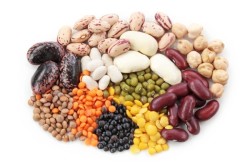There are seven pillars of good nutrition and every meal as far as practicable should include them in some form. This way you are eating a balanced diet which is essential for good health. The seven pillars are listed below.
 Carbohydrates are sugars, starches and fibres found in most foods. They provide energy, regulate digestion, support immune functions and help with communication between cells. They are two types, simple (cakes, soft drinks, biscuits, bread, pasta) and complex (sweet potato, wild rice, plantain) the latter providing more health benefits. The more complex the carbohydrate the slower the glucose and hormones are released into the body. This makes for a more stable and sustainable energy level. Complex carbohydrates also assist with appetite control and provide the body with dietary fibre which in turn helps with elimination, lowering of cholesterol, colon cleansing and the provision of food for the good bacteria in your gut. Simple carbohydrates on the other hand release glucose very quickly into the blood stream, give you an immediate burst of short term energy (spike) and leave you feeling hungry after a short period of time. This is not conducive to good health as these spikes can damage your organs.
Carbohydrates are sugars, starches and fibres found in most foods. They provide energy, regulate digestion, support immune functions and help with communication between cells. They are two types, simple (cakes, soft drinks, biscuits, bread, pasta) and complex (sweet potato, wild rice, plantain) the latter providing more health benefits. The more complex the carbohydrate the slower the glucose and hormones are released into the body. This makes for a more stable and sustainable energy level. Complex carbohydrates also assist with appetite control and provide the body with dietary fibre which in turn helps with elimination, lowering of cholesterol, colon cleansing and the provision of food for the good bacteria in your gut. Simple carbohydrates on the other hand release glucose very quickly into the blood stream, give you an immediate burst of short term energy (spike) and leave you feeling hungry after a short period of time. This is not conducive to good health as these spikes can damage your organs.
Proteins are the second most common element in the body after water. They are used by the body to build, maintain and repair muscle tissue. They make hormones, enzymes, skin, blood, bones, cartilage and other body chemicals and the immune system. Proteins are made up mainly of amino acids of which they are about twenty, nine of which are considered essential, mainly because they must be supplied by your diet. Proteins come from beef, pork, lamb, fish, chicken and eggs and also pulses and legumes such as beans and black eyed peas, chickpeas, lentils, quinoa, almonds and Greek yoghurt. Proteins from these non-animal sources are low in fat and cholesterol and are full of fibre. A diet with a heavy concentration on animal protein often provides much more protein than the body needs and can be toxic, as meat is acid forming and an imbalance of acid/alkaline can lead to inflammation and disease. Vegans and vegetarians should vary their diet regularly, as plants do not contain the full amounts of amino acids, the building blocks of protein. Varying the types of vegetables and herbs means that what is not available in one vegetable is made up for by another. Proteins have a high thermogenic effect that helps stimulate your metabolism. This is because it takes more calories to chew and digest protein than carbohydrates so proteins can help with weight loss.
 Fats provide your body with energy and also help with the assimilation of vitamins A, D, E and K. It also insulates your body and the fatty acids play a role in brain development, blood clotting and the management of inflammation. They also help the body use proteins and carbohydrates more efficiently and when eaten make you feel more satisfied. There are three types of fats. Saturated fats are found in animal products (meat, milk) and are said to increase HDL “bad” cholesterol. Current thinking is that saturated fats that come from grass fed animals and free range chickens that are corn fed are quite healthy. However there are some saturated fats that are unquestionably beneficial to the body and help with the promotion of good health. One such fat is lauric acid from coconut oil. Trans- fats are formed when vegetable oils are hydrogenated to prolong their shelf life. They are found in processed and baked foods and are considered to be very unhealthy. Unsaturated fats are considered the healthiest of all and are derived mainly from fish (omega 3) nuts, pumpkin seeds, flaxseeds, mackerel, herring, salmon, avocados and olive oil. It is important when choosing unsaturated fats (oils) to avoid those that say “hydrogenated” or “partially hydrogenated”.
Fats provide your body with energy and also help with the assimilation of vitamins A, D, E and K. It also insulates your body and the fatty acids play a role in brain development, blood clotting and the management of inflammation. They also help the body use proteins and carbohydrates more efficiently and when eaten make you feel more satisfied. There are three types of fats. Saturated fats are found in animal products (meat, milk) and are said to increase HDL “bad” cholesterol. Current thinking is that saturated fats that come from grass fed animals and free range chickens that are corn fed are quite healthy. However there are some saturated fats that are unquestionably beneficial to the body and help with the promotion of good health. One such fat is lauric acid from coconut oil. Trans- fats are formed when vegetable oils are hydrogenated to prolong their shelf life. They are found in processed and baked foods and are considered to be very unhealthy. Unsaturated fats are considered the healthiest of all and are derived mainly from fish (omega 3) nuts, pumpkin seeds, flaxseeds, mackerel, herring, salmon, avocados and olive oil. It is important when choosing unsaturated fats (oils) to avoid those that say “hydrogenated” or “partially hydrogenated”.
Vitamins are essential for good health. They help heal wounds, boost your immune system, help convert food into energy and repair damage to cells and lack of vitamins can result in the contraction of certain diseases. Vitamins can be fat soluble, meaning they should be taken with fat and can be stored in the body (A, D,E, K) or water soluble, those which cannot be stored in the body and need to be replenished ever so often (B, C). The exception is B12, which can be stored in the body. Vitamins are organic and can be broken down by heat, air and acid and become inactive as a result. They work in tandem with minerals but sometimes there can be an adverse interaction. For example, vitamin C helps your body absorb iron but can block its ability to absorb copper. You should get your daily requirement of vitamins from the foods you eat.
 Minerals mainly come into the body through food from all sources. They are categorized as major or minor (trace), depending on the amounts needed by the body for proper functioning. Major minerals like potassium, sodium and chloride help maintain the proper balance of water in the body. Trace minerals are needed by the body but only in small amounts. These are iron, zinc, manganese, copper, fluoride, chromium, selenium and molybdenum iodine. Of the trace minerals the most important are zinc, selenium, iron and copper all of which are found in a wide variety of foods. Minerals help our bodies to grow, develop and stay healthy. They are also used to build strong bones, convey nerve impulses, create hormones and keep our heartbeat normal. They work with vitamins to perform many functions in the body. Trace minerals carry out various tasks in the body. Iron, for example, carries oxygen throughout the body and zinc not only helps the blood to clot but bolsters the immune system as well and is essential for taste and smell.
Minerals mainly come into the body through food from all sources. They are categorized as major or minor (trace), depending on the amounts needed by the body for proper functioning. Major minerals like potassium, sodium and chloride help maintain the proper balance of water in the body. Trace minerals are needed by the body but only in small amounts. These are iron, zinc, manganese, copper, fluoride, chromium, selenium and molybdenum iodine. Of the trace minerals the most important are zinc, selenium, iron and copper all of which are found in a wide variety of foods. Minerals help our bodies to grow, develop and stay healthy. They are also used to build strong bones, convey nerve impulses, create hormones and keep our heartbeat normal. They work with vitamins to perform many functions in the body. Trace minerals carry out various tasks in the body. Iron, for example, carries oxygen throughout the body and zinc not only helps the blood to clot but bolsters the immune system as well and is essential for taste and smell.
 Water is extremely vital and should be replenished daily. It is second only to air as an essential for life. Many processes in your body rely on it but you lose about two to three quarts of it daily through urination, sweating and breathing. You may only survive a week without water and if you were to lose 20% of your water you would die. It makes up about 60% of the male body and about 50% of the female body. Your blood is 83% water, your heart 79%, your muscle 75%, brain 75% and your skin 72%. Water helps to maintain body temperature, metabolize fat, cushions and lubricate organs, helps with digestion and flushes toxins from the body. Water, like carbohydrates, fats and protein is considered a macro-nutrient as it is vital for life.
Water is extremely vital and should be replenished daily. It is second only to air as an essential for life. Many processes in your body rely on it but you lose about two to three quarts of it daily through urination, sweating and breathing. You may only survive a week without water and if you were to lose 20% of your water you would die. It makes up about 60% of the male body and about 50% of the female body. Your blood is 83% water, your heart 79%, your muscle 75%, brain 75% and your skin 72%. Water helps to maintain body temperature, metabolize fat, cushions and lubricate organs, helps with digestion and flushes toxins from the body. Water, like carbohydrates, fats and protein is considered a macro-nutrient as it is vital for life.
Fibre is only derived from plant food and has many health benefits. It not only improves digestive health but helps prevent heart disease, diabetes, weight gain and some cancers. There are two types, soluble and insoluble and a healthy diet should include both. Insoluble fibre passes through the gut undigested and helps to keep the bowels healthy, prevents digestive problems and as a result reduce the risk if colonic cancer. Good sources are coconut, nuts and bran. Soluble fibre can be digested and helps reduce the amount of cholesterol in your blood. It bulks you up and helps with elimination. Water is essential here as it acts as a lubricant and prevents constipation.. Good sources of soluble fibre are sweet potato, bananas, apples barley and carrots. The flesh of the coconut is probably the best source of insoluble fibre although the woody parts of herbs are also good sources. There are some foods like sweet potato and green bananas that provide both soluble and insoluble fibre. Fibre also provides food for the good bacteria in your gut.

Very informative.
Greetings! Very useful advice in this post! It is the little changes that produce
the best results . Thanks for sharing!
I’m impressed, I must say. Rarely do I come across a blog that’s both educative and interesting, and let me
tell you, you have hit the nail on the head. The issue is something which too few folks are speaking intelligently
about. I’m very happy that I stumbled across this.